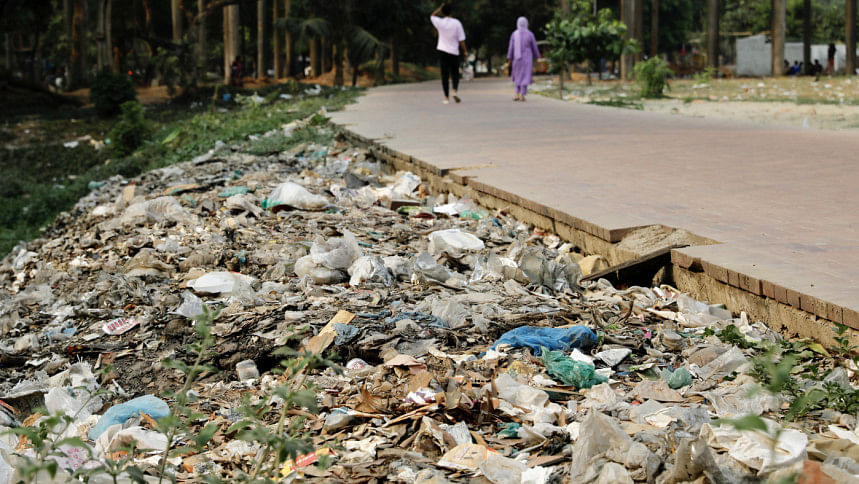Mindless littering and our inability to keep our streets clean

Stuck in traffic, my uncle—a brilliant doctor, whose mind expands well beyond my reach—recently returned from a medical course in Singapore and leaned back in his seat, speaking about the city-state's stringent laws. Singapore, he said, functioned like a well-oiled machine. No one littered there; the mere thought of tossing a wrapper on the ground came with the consequence of a thousand-dollar fine. He spoke with the kind of reverence usually reserved for holy sites. And then, mid-sentence, without so much as a pause, he rolled down the window and flung something out onto the Dhaka streets. I blinked. Had I imagined it? The irony hung between us. Perhaps it was habit, muscle memory, or the subconscious override of years spent knowing there was no price to pay for carelessness.
Such is the case with the people of Bangladesh. One afternoon on my university bus, I watched a girl unwrap a snack, eat it, then—without hesitation, without even a flicker of awareness—crumple the empty packet and toss it out the window. The motion was instinctual, as if the streets of Dhaka were nothing more than an extension of the bin, she didn't feel the need to use. I couldn't help myself—I asked if she thought what she had just done was right. She looked startled, mumbled an apology, but I knew, with absolute certainty, that the city would see more litter from her hands. A good education, it turns out, does little to correct bad habits.
The streets would absorb it all, as they always did, as if this was simply how things were meant to be.
It's a subtle kind of disillusionment—watching children toss wrappers onto the street while their parents, unfazed, look straight ahead. There's no reprimand, no moment of correction, because, of course, the parents do the same. I try to be a nuisance about it, a small disruption in the rhythm of their indifference, but I rarely succeed. Teaching someone the collective responsibility of keeping a city clean feels like trying to empty the Buriganga with a teacup. The response is always the same, a phrase that makes me angry—Everyone else does it. As if filth were a democracy, as if participation were mandatory.
If everyone is complicit in turning the streets into a wasteland, why rush to add to the ruin? My bag, overstuffed with receipts, wrappers, and the occasional stray bottle cap, resents me for making it double as a dustbin. But I carry my trash like a quiet rebellion, a small defiance against the tide of indifference. At least the streets have no reason to curse my name.
"The people of this country will never change," someone declares, punctuating the thought with a spit onto the pavement. The irony is almost too perfect. It's astonishing—the ease with which people refuse to alter the smallest of habits while demanding transformation on a grand scale. Some, in a feat of mental gymnastics, even absolve themselves entirely saying, at least this gives the cleaners something to do. As if the dignity of labour must include scraping their discarded wrappers off the asphalt. As if cleaners have nothing more pressing to tend to than the trail of thoughtlessness left in their wake.
"Everyone else is doing it"—the easiest excuse for avoiding responsibility. It suggests that if enough people do something wrong, it somehow stops being wrong. But litter doesn't disappear just because many hands have thrown it; it piles up, choking drains, cluttering streets, and making the city harder to live in. If anything, seeing others litter should make us more determined not to. The excuse also shifts blame onto an invisible crowd, as if the problem exists in the abstract, never in the individual act of tossing a wrapper onto the pavement. Change has to start somewhere, and refusing to contribute to the mess is as good a place as any.
Before praising the spotless streets of some distant, developed nation, perhaps the better question would be to ask: What am I doing to keep my own streets clean? It's easy to admire discipline from afar, to romanticise the strict fines and civic responsibility of another country, but the real work begins with the smallest, most inconvenient choices. Even if your bag groans under the weight of stray wrappers and receipts, even if you become that insufferable person who points out every careless toss, it's worth it. My family rolls their eyes at me, sighs when I refuse to let things slide, but they litter less. And in a city where change feels impossible, even the smallest shift feels like a big win.
Azra Humayra is majoring in mass communication and journalism at the University of Dhaka. Find her at: [email protected]

 For all latest news, follow The Daily Star's Google News channel.
For all latest news, follow The Daily Star's Google News channel. 




Comments